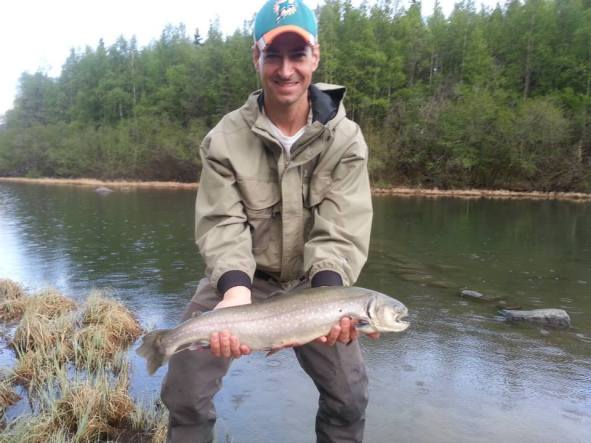My brother moved to Anchorage, Alaska over 2 years ago to take a job as a TV reporter for KTUU. Adam has lived all over the country, but Alaska was still a culture shock from him– after all, my family is from Miami! Last year, I had the opportunity to visit him there and we sat down for a Kind of New Orleanian interview.
This is part 2. Read part 1 here.

Adam Pinsker at the Yukon border, during a drive through Alaska. The Yukon is a Canadian territory that borders Alaska.
What are the politics here like in the state?
I think people mistake it for being a very right-wing place. It’s definitely a solid red state, but there’s a Libertarian, progressive streak here. This is a very unionized state. They value hard work here.
People here are very civically minded, especially about local politics. People genuinely care about how things go here because there’s such a small population and the state hasn’t been around that long.

There’s a lot of pride in Alaskan statehood. Here’s a cup from the 49th State Brewery, near Denali National Park.
I’ve noticed people have a lot of pride in Alaska’s statehood.
They’re really passionate. There’s so many people here who were alive when the state was founded.
So you think that’s got a lot to do with it?
Yeah. Statehood was a long struggle. They actually tried to make this place a state in the 1920s.
People here seem very hardcore about being from Alaska. Do you think it’s because it can be hard to live here?
It’s a badge of honor if you survive 5, 10, 15, years here. People here have pride in weathering the tough climate. I’ve been in sub-zero temperatures and boy, it’s cold. You feel the difference from when it’s minus five to when it’s 25 degrees.
What kind of effect have the long days of darkness and light had on you?
You know what? The winter is worse than the summer. It doesn’t matter what time you go to bed, you can go to bed at 10 o’clock at night, fall asleep instantly and get up at 6 am and still feel like crap, even though that’s the best time to sleep.
I never have a problem falling asleep when it’s light out. I have a problem staying asleep. That’s always been the issue because you wake up, and your mind doesn’t understand what time it is. You don’t know if it’s 11:00 in the morning or if it’s 5:00 in the morning. It looks the same.
From a professional standpoint, working an evening shift is really hard. I had to do an interview in mid-November when the sun sets around 3:30. I got into work around 1:30 and we had to immediately rush up to this place, grab the person, and interview him on the spot because we’re literally losing daylight by the minute.

Anchorage, Alaska, 10 p.m., August 2013. In the summer, there can be almost 12 hours of daylight in Alaska.

Pictures from the spot in Healy, Alaska, just outside of Denali National Park. In the summer, there can be almost 12 hours of daylight in Alaska.
Is it depressing in the winter time?
I think that aspect of living in Alaska was a little overblown. But I’ve only done one winter here. I just kept myself so busy that I didn’t have time to think of it. But I live in a big city. If it’s a dreary, miserable winter day where the sun sets at 2, I can run out and go to a movie, rent a movie or go to a friend’s house. If I’m in one of these villages I might not have a movie theater or internet access. So either I read a book or I socialize. But you can only socialize with the same people so many times. It really depends, culturally.
So what are your favorite things about the state and what are some of your least favorite things?
Definitely the scenery. The mountains are just amazing. My least favorite things is definitely the distance from everything. I don’t know anybody who lives in Anchorage, beyond people I’ve met already here.
Do you think you would’ve ever come up here had you not lived here?
Honestly, probably not. Not because I’m closed off to it, but because it’s almost like travelling to Europe. You have to have the time, money and means to do it. And that’s one of the reasons I came here. Not only am I going to be working professionally, but I have a chance to see a side of things I’ve never seen before.
If there’s one thing that you would recommend people see in Alaska, what would that be?
I think if you could see one thing, it would just be the Kenai fjords. There, you get a sample of all of Alaska almost in one. You get the rugged wildlife and the mountains. Then you get out to the ocean and you see the finned animals and whales, all that within a 150-mile radius. Whereas if you go up to Denali you see Mt. McKinley, but you won’t see a walrus in Denali.
What is one thing you want people to know about Alaska?
It’s not a backwoods. It does have a frontier atmosphere to it, but it’s part of the United States. It’s far away geographically, but it’s not some caveman-like tundra.
More Kind of New Orleanian Interviews:



